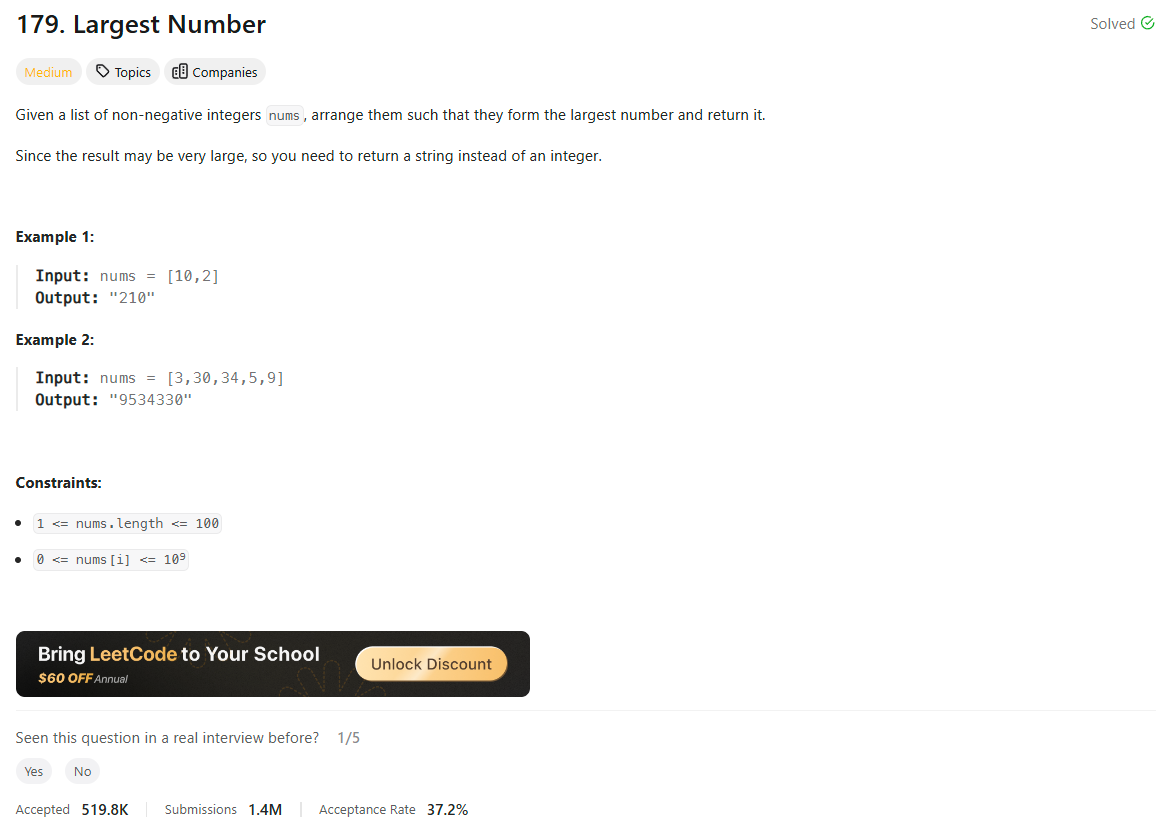Problem of The Day: Largest Number
Problem Statement

Notes:
- Need to review
- Good problem to review sorting techniques
- Just memorize merge sort and quick sort for interview
Editorial
Approach 1: Using Built-in Function
class Solution:
def largestNumber(self, nums: List[int]) -> str:
# Convert each integer to a string
num_strings = [str(num) for num in nums]
# Sort strings based on concatenated values
num_strings.sort(key=lambda a: a * 10, reverse=True)
# Handle the case where the largest number is zero
if num_strings[0] == "0":
return "0"
# Concatenate sorted strings to form the largest number
return "".join(num_strings)
Let n be the size of the nums array.
-
Time Complexity: O(n log n)
The most time-consuming operation is the sorting step, which uses a custom comparator. The sorting algorithm has a time complexity of O(n log n). The conversion of numbers to strings and concatenation operations are linear with respect to the number of elements.
-
Space Complexity: O(n + S)
Additional space is used for storing the string representations of the numbers and the final concatenated result, which scales linearly with the size of the input array.
Some extra space is used when we sort an array of size n in place. The space complexity of the sorting algorithm (S) depends on the programming language. The value of S depends on the programming language and the sorting algorithm being used:
- In Python, the
sortmethod sorts a list using the Timsort algorithm, which is a combination of Merge Sort and Insertion Sort and has a space complexity of O(n). - In C++, the
sort()function is implemented as a hybrid of Quick Sort, Heap Sort, and Insertion Sort, with a worst-case space complexity of O(log n). - In Java,
Arrays.sort()is implemented using a variant of the Quick Sort algorithm which has a space complexity of O(log n).
- In Python, the
Thus, the total space complexity of the algorithm is O(n + S).
Approach 2: Quick Sort
class Solution:
def largestNumber(self, nums: List[int]) -> str:
# Sort the numbers using Quick Sort
self._quick_sort(nums, 0, len(nums) - 1)
# Concatenate sorted numbers to form the largest number
largest_num = "".join(map(str, nums))
# Handle the case where the largest number is zero
return "0" if largest_num[0] == "0" else largest_num
def _quick_sort(self, nums: List[int], left: int, right: int) -> None:
# Base case: if the range has one or no elements, it is already sorted
if left >= right:
return
# Partition the array and get the pivot index
pivot_index = self._partition(nums, left, right)
# Recursively sort the sub-arrays
self._quick_sort(nums, left, pivot_index - 1)
self._quick_sort(nums, pivot_index + 1, right)
def _partition(self, nums: List[int], left: int, right: int) -> int:
pivot = nums[right]
low_index = left
# Rearrange elements so that those greater than the pivot are on the left
for i in range(left, right):
if self._compare(nums[i], pivot):
nums[i], nums[low_index] = nums[low_index], nums[i]
low_index += 1
# Place the pivot in its correct position
nums[low_index], nums[right] = nums[right], nums[low_index]
return low_index
def _compare(self, first_num: int, second_num: int) -> bool:
# Compare concatenated strings to decide the order
return str(first_num) + str(second_num) > str(second_num) + str(
first_num
)
- time: O(n log n)
- space: O(log n)
Approach 3: Merge Sort
class Solution:
def largestNumber(self, nums: List[int]) -> str:
# Sort the numbers using Merge Sort
sorted_nums = self._merge_sort(nums, 0, len(nums) - 1)
# Concatenate sorted numbers to form the largest number
largest_num = "".join(map(str, sorted_nums))
# Handle the case where the largest number is zero
return "0" if largest_num[0] == "0" else largest_num
def _merge_sort(self, nums: List[int], left: int, right: int) -> List[int]:
# Base case: a single element is already sorted
if left >= right:
return [nums[left]]
mid = left + (right - left) // 2
# Recursively sort the left and right halves
left_half = self._merge_sort(nums, left, mid)
right_half = self._merge_sort(nums, mid + 1, right)
# Merge the sorted halves
return self._merge(left_half, right_half)
def _merge(self, left_half: List[int], right_half: List[int]) -> List[int]:
sorted_nums = []
left_index, right_index = 0, 0
# Merge the two halves based on custom comparison
while left_index < len(left_half) and right_index < len(right_half):
if self._compare(left_half[left_index], right_half[right_index]):
sorted_nums.append(left_half[left_index])
left_index += 1
else:
sorted_nums.append(right_half[right_index])
right_index += 1
# Append remaining elements from left half
sorted_nums.extend(left_half[left_index:])
# Append remaining elements from right half
sorted_nums.extend(right_half[right_index:])
return sorted_nums
def _compare(self, first_num: int, second_num: int) -> bool:
# Compare concatenated strings to decide the order
return str(first_num) + str(second_num) > str(second_num) + str(
first_num
)
- time: O(n log n)
- space: O(n)
Approach 4: HeapSort
class Solution:
def largestNumber(self, nums: List[int]) -> str:
# Edge case: if all numbers are zero, return "0"
if not any(nums):
return "0"
# Custom comparison function for heapq (simulating the comparator in Java)
class LargerStrComparator(str):
def __lt__(self, other):
# Custom comparison: return True if self+other > other+self
return self + other > other + self
# Priority queue (min-heap), but we push elements using a custom comparator
heap = []
for num in nums:
heapq.heappush(heap, LargerStrComparator(str(num)))
# Build the result string by popping from the heap
result = []
while heap:
result.append(heapq.heappop(heap))
# Concatenate and return the result
largest_num = "".join(result)
# Handle case where all elements are "0"
return "0" if largest_num[0] == "0" else largest_num
- time: O(n log n)
- space: O(n log k)